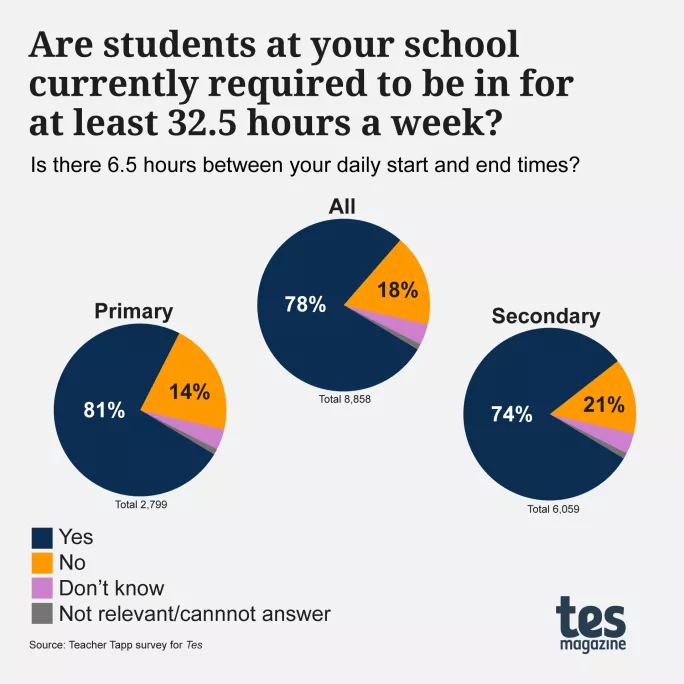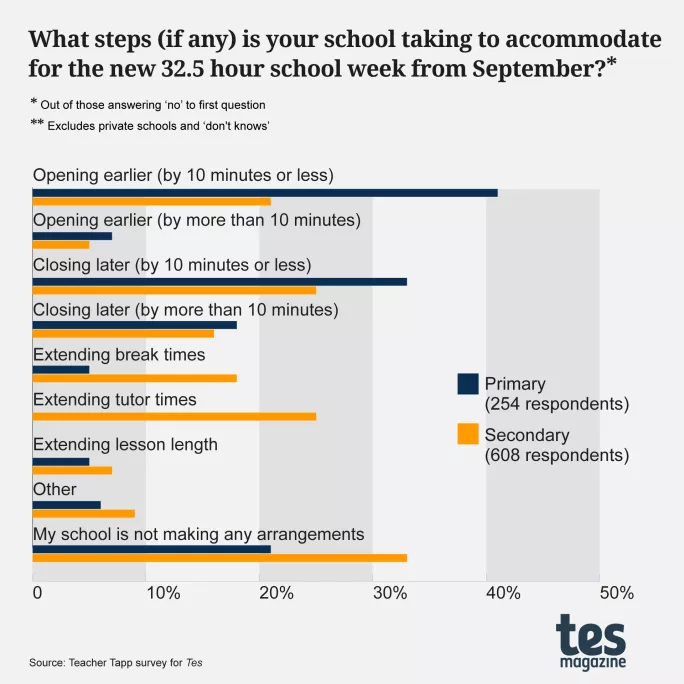Just 6% of schools to lengthen lessons under 32.5-hour rule

Hardly any schools are planning to extend lesson times in order to hit the government target of a 32.5-hour week, survey findings for Tes reveal.
The findings, from a Teacher Tapp survey of nearly 9,000 teachers and leaders, show how the Department for Education’s “flawed policy” will have ”no impact on teaching time”, according to a union leader.
The DfE has said, by September 2023 at the latest, all state-funded, mainstream schools will be expected to provide a school week of at least 32.5 hours.

Over one-fifth (21 per cent) of state secondary schools and 14 per cent of state primaries are not currently offering 32.5 hours, according to the survey carried out last week.
Of those, only 6 per cent are planning to extend lesson times to hit the target (5 per cent of primary schools and 7 per cent of secondaries), the findings suggest.
And those choosing to open earlier or close later from September are mainly doing so by no more than 10 minutes.

Nearly a third (32 per cent) of schools that are not currently hitting 32.5 hours are planning to open their doors up to 10 minutes earlier than at present, while 6 per cent are opening more than 10 minutes earlier.
And 29 per cent are closing later, but by no more than 10 minutes, while 17 per cent are closing at least 11 minutes later.
Some 11 per cent are extending break times, and 12 per cent are extending tutor times.
However, more than a quarter (26 per cent) of state schools offering less than the expected 32.5 hours are not making any changes at all (21 per cent of primaries, 33 per cent of secondaries), the survey finds.
- Guidance: Heads ‘in dark’ as 32.5-hour school week deadline looms
- News: Ditch or delay 32.5-hour rule, heads tell Gibb
- Breaktimes: Why a 32.5-hour week will just lead to longer lunchtimes
Geoff Barton, general secretary of the Association of School and College Leaders, said the survey findings reflect what the union had been saying to the government from the outset of this “flawed policy”.
Most schools were “pretty close” to offering 32.5-hour weeks already, meaning the rule would result in “only minor tweaks to opening and closing times and have little to no impact on teaching time”, he said.
Mr Barton added: “This silly policy is actually a distraction from what really matters - and that is what happens in the classroom. The problem in education is not the length of school weeks but the critical shortage of funding and teachers.
”Ministers have lost the plot. They tinker at the edges and announce gimmicky policies but seem incapable of doing the things that matter.”
All schools maintained by the local authority and special schools not maintained by the local authority are required to meet for at least 380 sessions, or 190 days, during the school year to educate pupils, according to DfE rules. They must operate two sessions for every school day, divided by a break in the middle of the day.
Since last September, all state schools have also been “expected” to publish their opening times on their school website, and - from this Spring - to submit the length of their school week via the school census.
And, from September 2023 at the latest, all state-funded, mainstream schools will be expected to provide a compulsory school week of at least 32.5 hours.
The DfE said in its Schools White Paper that it would publish extra guidance on the 32.5 expectation in summer 2022.
But Tes revealed last month how heads felt they had been “left in the dark” due to a lack of guidance on the policy, before exclusively reporting how school leaders’ unions had urged ministers to “ditch or delay” the policy.
Lack of guidance ‘becoming ridiculous’
Ian Hartwright, head of policy (professional) at the NAHT school leaders’ union, said that the survey findings show the policy is “nothing short of an enormous distraction that will almost certainly have no impact on pupil outcomes”.
He said: “There’s virtually no evidence to suggest that adding a small amount of time to the school day will benefit pupils, but plenty to indicate it will create significant financial and logistical challenges for many schools.”
The lack of guidance was “becoming really quite ridiculous”, he added.
He urged the government to focus on “more important priorities”, such as school staff recruitment and retention.
A DfE spokesperson agreed that the majority of schools already deliver a 32.5-hour week - equivalent to 8:45am to 3:15pm Monday to Friday.
They added: “The Schools White Paper in March 2022 made clear that we expect all mainstream schools to meet this expectation, and those that are not yet doing so should work towards it as soon as possible. We will share an update on guidance in due course.”
Register with Tes and you can read two free articles every month plus you'll have access to our range of award-winning newsletters.
Keep reading with our special offer!
You’ve reached your limit of free articles this month.
- Unlimited access to all Tes magazine content
- Save your favourite articles and gift them to your colleagues
- Exclusive subscriber-only stories
- Over 200,000 archived articles
- Unlimited access to all Tes magazine content
- Save your favourite articles and gift them to your colleagues
- Exclusive subscriber-only stories
- Over 200,000 archived articles
topics in this article



